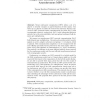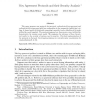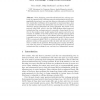1059 search results - page 34 / 212 » Modeling Security Protocols as Games |
FORTE
2008
13 years 10 months ago
2008
Network-based fuzz testing has become an effective mechanism to ensure the security and reliability of communication protocol systems. However, fuzz testing is still conducted in a...
ASIACRYPT
2007
Springer
14 years 22 days ago
2007
Springer
Secure multi-party computation (MPC) allows a set of n players to securely compute an agreed function of their inputs, even when up to t players are under the control of an adversa...
AFRICACRYPT
2009
Springer
14 years 3 months ago
2009
Springer
We propose a generic modelling technique that can be used to extend existing frameworks for theoretical security analysis in order to capture the use of timestamps. We apply this t...
IMA
1997
Springer
14 years 27 days ago
1997
Springer
This paper proposes new protocols for two goals: authenticated key agreement and authenticated key agreement with key con rmation in the asymmetric
public-key
setting. A formalm...
EUROCRYPT
2000
Springer
14 years 10 days ago
2000
Springer
Abstract. When designing password-authenticated key exchange protocols (as opposed to key exchange protocols authenticated using cryptographically secure keys), one must not allow ...



